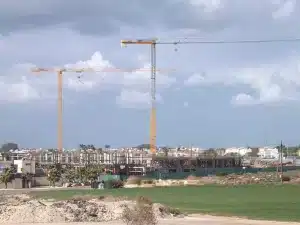Portugal’s far-right Chega (Ch) party made shock progress in the country’s parliamentary elections on Sunday, quadrupling its seats in the Assembly of the Republic to 48 out of 230 after gaining 18.06 percent of the vote.
However, the electoral race was won by the Democratic Alliance (AD), a center-right coalition of the Social Democratic Party (PSD), People’s Party (CDS-PP) and Monarchist Party (PPM). AD secured 29.5 percent of the vote, and 79 seats.
This victory paves the way for PSD President Luis Montenegro to be nominated as Portugal’s next prime minister, putting an end to nine years of rule by the Socialist Party (PS).
The PS won 28.66 percent of the vote, and secured 77 parliamentary mandates.
Coming in fourth was another right-wing political force, Iniciativa Liberal (IL), which re-elected eight deputies and achieved a 5.08 percent share of the vote.
A total of 66.2 percent of eligible voters cast their ballots on Sunday, with an abstention rate of 33.8 percent — the lowest since 1995.
Montenegro said he now expects President Marcelo Rebelo de Sousa to nominate him to form a government.
Asked about a potential coalition with Chega, Montenegro said that he would “never commit such a malicious act to himself, his party, and Portuguese democracy.”
Meanwhile, on the PS side, Pedro Nuno Santos acknowledged defeat and ruled out any maneuvers with left-wing parties to secure a majority and remain in government.
He said: “The PS did not win the elections and will lead the opposition, but will never hand over the opposition leadership to Chega.”
“We will work over the next months, in the future, to convince and regain all those dissatisfied with the political system and the PS. Our journey begins now, today,” Santos said.
Chega’s president Andre Ventura declared that “bipartisanship in Portugal is over.”
The far-right party leader added that his party had earned the right to be sought by PSD for an agreement, since the Portuguese had given the right-wing “a mandate to govern Portugal.”
Political scientist Paulo Moura told Xinhua that Portugal’s election results are not an isolated event, but a reaction to a trend.
“The shift in power from left to right in Portugal only highlights the strength of this resistance. The trend is global because these globalist policies are implemented on a worldwide scale,” Moura explained.
Helena Matos, an expert in Portuguese studies at the University Nova de Lisboa, said the PS’s defeat was due to the party itself, which had never formed a leadership capable of succeeding Prime Minister Antonio Costa.
Analyzing the election results for Radio Observador, she highlighted that Chega’s Andre Ventura is a strong leader who has emerged victorious from the election by undermining the credibility of traditional Portuguese parties.
According to Matos, socialist Pedro Nuno Santos will be a good opposition leader in the Portuguese Parliament, as demonstrated by his balanced posture in acknowledging defeat and the PS’s social decline.
The credit rating agency DBRS warned of the risk of Portugal having a “blocked parliament” and an “unstable government,” which could hinder the implementation of the Recovery and Resilience Plan (PRR).
According to the DBRS report, the election results suggest a challenging scenario for the governability and stability of the next government, as center-right parties won the elections by only a small margin.
“If the new government fails to pass legislation, it could increase the likelihood of another round of elections later this year or early next year,” warned Javier Rouillet, senior vice president of Morningstar DBRS, Global Sovereign Ratings.
Career diplomat Mario Vilalva said the election results point to the Europe-wide rise of the far right.
The Portuguese electoral calendar now provides for a meeting of the Permanent Commission of the Assembly of the Republic, the body that functions while the Parliament is dissolved. On March 15, the president must consult with the parties and indicate whom he will nominate as the prime minister.
The first plenary session of the new Portuguese Parliament is expected to take place in the first week of April, launching the debate on the government’s program, which must be submitted within 10 days after the appointment of the prime minister. If this program is rejected, the government must resign, and the procedure for its formation be repeated.





